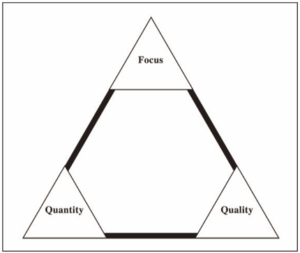Watch Paul’s presentation on the TESOLANZ YouTube channel
From the presentation to WATESOL by Paul Nation, March 2022
The principles of vocabulary learning (and any other kind of learning)
Paul Nation, LALS, Victoria University of Wellington
The requirements of learning
Vocabulary learning, and presumably most learning, depends on learners giving attention to what needs to be learned. The effectiveness of a learning activity depends on (1) the usefulness, clarity (comprehensibility) and accuracy of what is focused on, (2) the quantity or amount of attention (including repetition) given to what needs to be learned, and (3) the quality of the attention given. Figure 1 illustrates these three requirements.
Figure 1: The three aspects of attention that affect learning
The three triangles represent the requirements of attention that affect learning. The thick lines joining the triangles show that each requirement of attention is necessarily connected to the other aspects. A triangle is used to represent each requirement to show that each requirement involves a ranked cline of levels of effectiveness, from the point to the base.
In this analysis of attention and learning, no distinction has been made between incidental and deliberate learning. It is likely that difference between them is simply a matter of degree, that is, deliberate learning involves a greater quantity of focused attention than incidental learning.
References
Nation, I.S.P. (2022). Learning Vocabulary in Another Language. 3rd edition. Cambridge: Cambridge University Press.
Nation, I. S. P. & Coxhead, A. (2020). Measuring Native-Speaker Vocabulary Size. Amsterdam: John Benjamins.
van Hees, J. & Nation, P. (2017). What every Primary School Teacher should Know about Vocabulary. Wellington: NZCER.
Principles
Focus principles
- Focus: We learn what we focus on, so focus on the learning goal.
- Transfer-appropriateness: Our learning is more useful if it closely resembles the use that we need to make of what we learn. Learn across the four strands.
- Accuracy: Our learning is more useful if the information we are focusing on is complete, accurate and comprehensible.
Quantity principles
- Repetition: The more repetitions (verbatim and varied), the stronger the learning.
- Time-on-task: The greater and longer the attention, the stronger the learning.
Quality principles
- Desirable difficulty/effort: Spacing, retrieval, testing (rather than re-studying), interleaving, form recall vs meaning recall, and variation ensure a better quality of attention and a greater amount of attention resulting in better long-term retention.
- Levels of processing: Deliberate attention, elaboration and analysis increase and strengthen connections between the item to be learned and other knowledge making it easier to access the item.
Applying the principles: Teaching vocabulary
When deliberately teaching a word,
| during the first meeting with the word | at later meetings with the word | ||
| focus on the core meaning of the word | get the learners to recall the form | ||
| give some examples of use | get the learners to recall the meaning | ||
| give pronunciation practice | look at the role of the word in context | ||
| examine the context in which the word occurred | set the learners a task to do in pairs using the word | 7 | |
| provide some collocates | look at the word family | ||
| relate the word to other words taught at the same time | look at a concordance of the word | ||
| break the word into parts | provide other words with the same stem | ||
| relate to spelling rules | include in a spelling test or dictation | ||
| recall at the end of the lesson | use word cards and peer testing |
Using the four strands to balance the opportunities for learning helps balance the application of the principles of learning.
Task: For each of the applications in the above table, write the number of each principle which is applied. One has been done for you.
Task: How does extensive reading help vocabulary learning?
Learning and applying principles helps developing learning autonomy. Focusing on principles can be a part of word consciousness, but is also more widely applicable.
Task: Apply the principles to learning the Rode Code.
